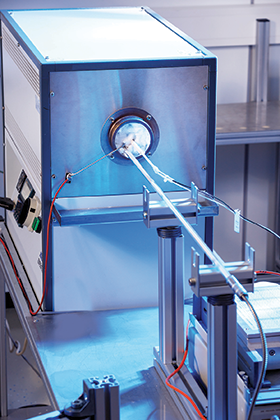

In semiconductor production plants, it is no exaggeration to claim that the heat is well and truly on. There are several manufacturing steps where very high temperatures are essential, for example during oxide production or CVD (chemical vapour deposition) under vacuum. A precise and stable temperature in the process area is an important control variable for both steps.
One semiconductor manufacturer monitors this in both areas using multipoint thermocouples, which enable a picture to be obtained of the temperature cycle over and above individual temperature values. These thermocouples are equipped with up to six measuring points.
A standard value with the permissible tolerances does not provide sufficient information on the temperature cycle; extreme precision is vital despite the high temperatures of +1000°C or more. The majority of multipoint thermocouples are therefore Type S/Class 1. They cover a measuring range from +200°C to +1200°C and guarantee accuracies of up to 1,3 K, even at high temperatures.
Type S thermocouples consist of Pt and PtRh thermoelectric wires, which are threaded into a non-conductive ceramic capillary. The points for the measurement nodes in this capillary are exposed. The thermowell for the multipoint, which is roughly 2000 mm in length, is made of quartz glass in order to reduce contaminants in the work process to a minimum. It also offers mechanical protection for this long instrument.
Like all measuring instruments, multipoint thermocouples require regular calibration. There are no fixed testing intervals here; these are determined by each user according to the frequency of use and the instrument’s history. In the aforementioned example, the user defined a traceable calibration. Only calibration laboratories which are accredited in accordance with DIN EN ISO/IEC 17025 specifications are suited for this task. The semiconductor manufacturer chose the Wika calibration laboratory for temperature, which apart from the necessary technical infrastructure, also has many years of experience carrying out complicated calibrations for multipoint thermocouples of this kind.
Multipoints are calibrated in a special tube furnace. Account must be taken here of the fragile quartz glass-ceramic structure – which is about 10 mm in diameter and up to 2000 mm long – by incorporating a precision-fit device in the heating zone and a stand outside the calibration furnace. These give the multipoints mechanical stability over their entire length as a condition for reliable and accurate positioning in the calibration equipment.
The measuring points are distributed over a section up to 1000 mm long and calibrated one at a time at the required temperatures, with a thermocouple that has already undergone traceable calibration serving as a reference. Using position markers, each measuring point of the device under test must be adjusted to the same position as the measuring point of the reference thermocouple.
The testing process depends on the particular customer’s application. Each measuring point is normally calibrated at four or five different temperatures in accordance with DKD-R 5-3 (calibration guideline), starting with the highest temperature value and working downward.
The calibration process makes it easy to understand why calibrating multipoint thermocouples is such a time-consuming task. The tube furnace is first heated to the highest temperature value and checked to make sure it is stable. The measurement begins as soon as the stability criteria for the calibration concerned are met. Once the acquisition of measured values is complete, the calibration process continues by cooling the devices to the next temperature point, and so on, down to the lowest point.
The full test procedure takes one or two days per measuring point, depending on the temperature range and the number of temperature points. Approximately two weeks are required in order to calibrate a complete, six-point thermocouple, including all evaluation and documentation activities.
When these thermocouples are used in semiconductor production, damage such as cracks in the ceramic or contamination of the thermoelectric wires due to diffusing particles can occur after a while, owing to the extreme conditions. This could result in measurement errors of up to 20 K or, in the worst instance, total failure. In most cases, repair is no longer possible and the multipoint will have to be replaced.
Irrespective of whether this damage is determined directly in the process or during calibration, the WIKA temperature laboratory can procure a replacement, calibrate the new multipoint thermocouple and deliver it together with the documentation. The contaminated precious metal from the defective instrument is offset against the market price.
Conclusion
Calibrating high-temperature multipoint thermocouples is a complicated and time-consuming process. Owing to the special design and customer requirements regarding traceable calibration with only small deviations, this calibration must take place in a laboratory which is accredited in accordance with DIN EN ISO/IEC 17025.
| Tel: | +27 11 621 0000 |
| Email: | [email protected] |
| www: | www.wika.co.za |
| Articles: | More information and articles about WIKA Instruments |

© Technews Publishing (Pty) Ltd | All Rights Reserved